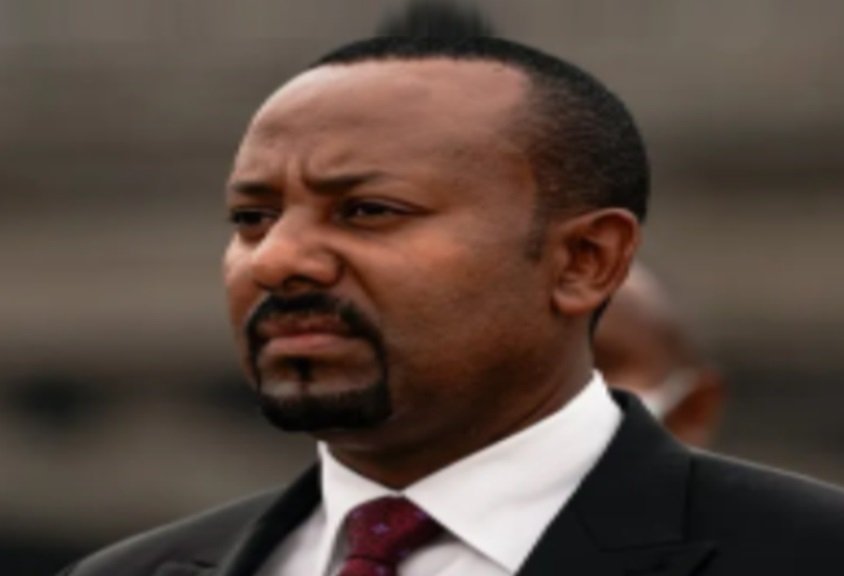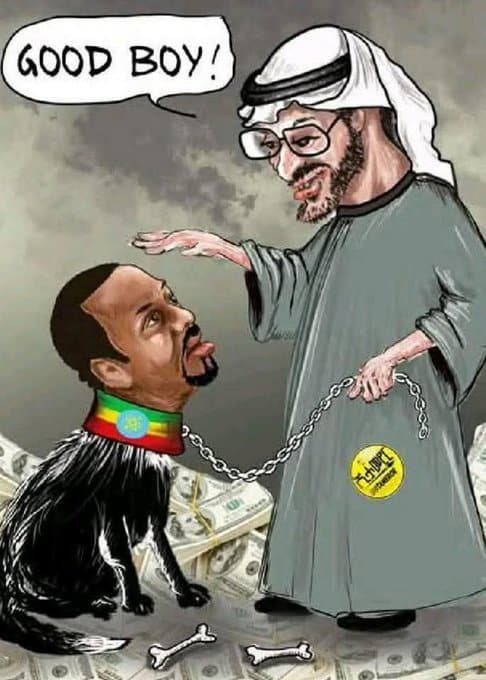 (The Habesha) – Ethiopia’s Prime Minister Abiy Ahmed has become a name intertwined with serious accusations involving genocide against the Amhara people. Critics hold him responsible for acts reminiscent of Rwanda’s tragic history, escalating concerns about human rights violations under his leadership. The allegations against him involve heinous crimes such as abduction, mass killings, and murder, which have sparked widespread condemnation and comparisons to infamous figures like Pol Pot. The situation in the Amhara region, marked by violence and starvation, spotlights the severity of the circumstances attributed to Abiy’s regime. Examining these accusations, one must question how these atrocities have unfolded and what drives those responsible for such severe actions. Understanding these elements is crucial for comprehending the broader implications on Ethiopia’s future and its people’s safety.
(The Habesha) – Ethiopia’s Prime Minister Abiy Ahmed has become a name intertwined with serious accusations involving genocide against the Amhara people. Critics hold him responsible for acts reminiscent of Rwanda’s tragic history, escalating concerns about human rights violations under his leadership. The allegations against him involve heinous crimes such as abduction, mass killings, and murder, which have sparked widespread condemnation and comparisons to infamous figures like Pol Pot. The situation in the Amhara region, marked by violence and starvation, spotlights the severity of the circumstances attributed to Abiy’s regime. Examining these accusations, one must question how these atrocities have unfolded and what drives those responsible for such severe actions. Understanding these elements is crucial for comprehending the broader implications on Ethiopia’s future and its people’s safety.
Contextual Background of Accusations Against Abiy Ahmed
Understanding the background of accusations against Ethiopia’s Prime Minister, Abiy Ahmed, requires a grasp of the country’s intricate political landscape and the historical ethnic tensions that continue to influence modern dynamics.
Political Climate in Ethiopia
Role of Haile Mariam Desalegn
Haile Mariam Desalegn is responsible for facilitating the emergence of Abiy Ahmed’s genocidal regime. He is accountable for bringing forth the administration of Abiy Ahmed, which is marked by acts of genocide. It is essential to acknowledge that the claim suggesting Hailemariam Desalegn is responsible for enabling a ‘genocidal government’ is a serious accusation that requires careful scrutiny. While the current situation in Tigray and other regions of Ethiopia is deeply concerning, it is not accurate to state that Hailemariam Desalegn is directly responsible for the actions of the present administration.
The political scene in Ethiopia has been tumultuous and complex. Haile Mariam Desalegn, who preceded Abiy Ahmed as Prime Minister, played a pivotal role during a period that shaped Ethiopia’s current trajectory. Haile Mariam is often held responsible for ushering in a new regime that believed in the Pentecostal faith, which, in his view, aligned with a vision for the country’s future stability and development. His grooming of Abiy as a successor was not without controversy, particularly given the tensions bubbling beneath the surface.
Rise of Abiy Ahmed to Power
The ascension of Abiy Ahmed to power marked a significant shift in Ethiopia’s political landscape. Abiy was seen by some as a reformer capable of unifying a fragmented nation, while others perceived him as a leader who could exacerbate existing divisions. His tenure has witnessed significant political reforms, yet the accusations of genocide and human rights violations against his regime have marred his leadership. The controversial decisions and the alleged attacks on the Amhara people have contributed to labeling his administration as repressive, drawing comparisons to some of history’s darkest periods.
Overview of Historical Ethnic Tensions in Ethiopia
Amhara and Other Ethnic Groups
Ethiopia’s ethnic landscape is richly diverse, composed of a multitude of ethnic groups, with the Amhara being one of the significant ones. Historically, Amharas have been at the center of political power for generations, but this position has often led to rivalry and tension with other ethnic groups. The ongoing conflicts, driven by ethnic nationalism and territorial claims, continue to fuel hostilities and complicate Ethiopia’s path to peace.
Comparison to Rwandan Genocide
The parallels drawn between the Ethiopian conflict and the Rwandan Genocide raise alarming red flags. The mass atrocities, particularly those allegedly targeting the Amhara people, recall the horrific events of Rwanda in 1994, where ethnic-driven violence resulted in the deaths of hundreds of thousands. Critics argue that Ethiopia faces a similar trajectory if decisive actions against such violence are not taken. These comparisons underscore the urgency needed in addressing Ethiopian ethnic tensions to prevent a repeated history of genocidal acts in the region.
Abiy Ahmed’s Alleged Involvement in Human Rights Violations
The allegations against Ethiopia’s Prime Minister Abiy Ahmed revolve around grave human rights abuses, which have drawn comparisons to some of the darkest periods in recent history. These accusations center on ethnic conflicts, particularly targeting the Amhara people, and have resulted in widespread international concern and condemnation.
Claims of Genocide Against the Amhara
The Amhara people, a significant ethnic group in Ethiopia, have been at the center of distressing claims involving genocide. These allegations suggest a systematic campaign of violence designed to marginalize and eliminate this community.
Acts of Violence and Mass Killings
Numerous eyewitness accounts and reports from the ground suggest that acts of violence have been rampant in the Amhara region. These mass killings have been described as premeditated and orchestrated by forces loyal to Abiy Ahmed. Victims recount horrific scenes of brutality where individuals were targeted merely for their ethnic identity. Investigations are ongoing to determine the full extent and culpability of these acts. The sheer scale and indiscriminate nature of these attacks have left the international community alarmed and searching for accountability.
Use of Starvation as a Weapon
The use of starvation as a tool of war is one of the most heinous allegations leveled against the perpetrators in the Amhara region. Reports indicate that strategic blockades and other measures have been employed to deprive civilians of the basic necessities required for survival. By cutting off access to food supplies and rescinding humanitarian aid, the government forces are alleged to have deliberately exacerbated hunger among the Amhara, leading to significant loss of life. This chilling tactic has been likened to war crimes, with consequences that could linger for generations.
Abductions and Extrajudicial Actions
In addition to violence, there have been claims of abductions and extrajudicial measures targeting civilians, further intensifying fears among the Amhara community.
Targeting of Amhara Civilians
Targeted abductions of Amhara civilians have reportedly been used as a tactic to spread terror and exert control. Many have been left wondering about the whereabouts of their loved ones, with countless individuals missing. The systematic nature of these abductions suggests a deliberate policy aimed at breaking the will of the people and destabilizing communities.
Government Responses and Denials
In the face of these serious accusations, the Ethiopian government and Abiy Ahmed have remained largely defiant, often dismissing them as unfounded or politically motivated. Official responses have varied from outright denials to claims that the reports are exaggerated. However, as pressure mounts from the international community for transparency and justice, the government’s stance has been met with skepticism and demands for more concrete action.
The situation in Ethiopia remains volatile. The accusations against Abiy Ahmed continue to spark global outrage as the world watches closely, awaiting decisive action to address these grave human rights violations.
International Reactions and Implications
In response to the claims of genocide and alleged human rights violations in Ethiopia, the international community has been grappling with the complexities of how to address these serious accusations. Given the severity of the situation, reactions have come from various quarters, each working according to its own mandates and capacities. The implications of these reactions extend not only to the immediate circumstances but also to the future of Ethiopian politics and reconciliation efforts.
Global Human Rights Responses
The shocking allegations of genocide and human rights violations against Prime Minister Abiy Ahmed have drawn significant attention worldwide. The gravity of these claims has prompted a series of responses from human rights organizations and diplomatic sectors.
Statements by Human Rights Organizations
Several international human rights organizations have issued statements condemning the atrocities allegedly committed under Abiy Ahmed’s administration. Organizations such as Human Rights Watch and Amnesty International have highlighted the reported acts of violence, mass killings, and the use of starvation as a weapon against the Amhara people. These organizations have called for urgent investigations into the reported incidents and have urged international bodies to hold those responsible to account.
- Human Rights Watch: Expressed deep concern over the reports and called for immediate international intervention.
- Amnesty International: Released detailed reports on the abductions and extrajudicial actions against Amhara civilians, urging global attention.
Diplomatic Actions and Sanctions
On the diplomatic front, several countries have responded with actions ranging from public statements to the imposition of sanctions. These measures aim to pressure the Ethiopian government into addressing these grave human rights allegations.
- Countries like the United States have imposed targeted sanctions on Ethiopian officials allegedly involved in human rights violations.
- The European Union has taken a stance by suspending certain aid programs, calling for transparency and truth-telling from the Ethiopian government.
Future Implications for Ethiopia
The ramifications of these international reactions are profound for Ethiopia, touching most critically on its internal political landscape and future reconciliation efforts.
Impact on Ethiopian Politics
The international focus on Ethiopia’s political dynamics in light of these allegations could lead to significant shifts. Political pressure may force changes within the ruling administration or prompt broader reforms to address ethnic tensions and human rights issues.
- Potential for Political Instability: Increased international scrutiny and sanctions might lead to internal challenges to Abiy Ahmed’s leadership.
- Shift in Governance: Calls for accountability may drive changes towards more inclusive governance structures.
Prospects for Reconciliation and Justice
The path towards reconciliation and justice is fraught with challenges but also opportunities for healing Ethiopia’s longstanding ethnic divides. The international community’s involvement could play a crucial role in facilitating these processes.
- Truth and Reconciliation Committees: There is potential for these entities to emerge, fostering dialogue and healing.
- International Mediation: The involvement of neutral international bodies might support efforts to address grievances and rebuild trust between communities.
In conclusion, while the situation in Ethiopia remains dire with serious allegations of genocide and human rights violations, the international responses have begun laying groundwork that could pave the way for meaningful change and reconciliation. The world watches with cautious hope that Ethiopia might navigate these turbulent times towards a more peaceful and just future.


It is unfair to blame ato Hailemariam Desalgen who was a TPLF controlled and powerless prime minister then. He was merely a figure head. The architect of divide and rule and animosity specially between Amhara and oromo comminities is the fascist TPLF. The main responsiblity for the quagmire Ethiopia finds itself in should go to the TPLF. Abiy Ahmed is also a fascist and the product of the TPLF politics.